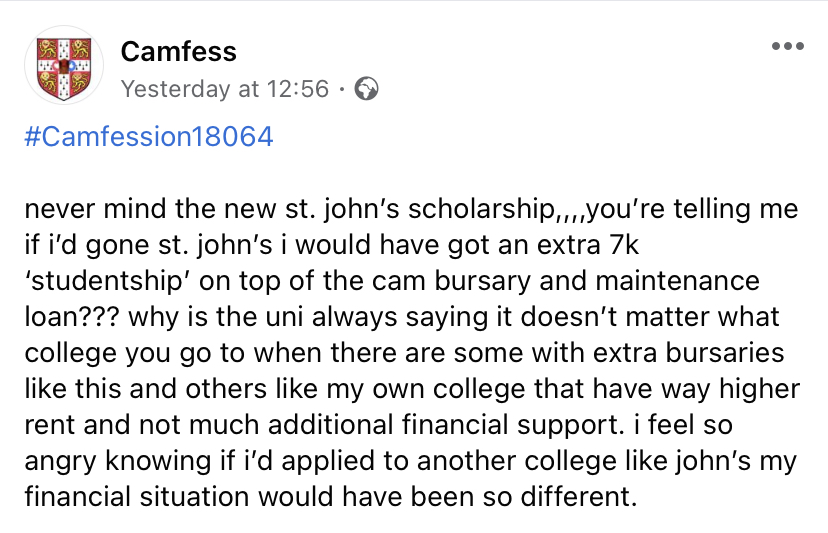
St John’s Free Places Programme: A poorly executed dream
Whilst the offer of free university places is a big step in the right direction, the glaring issues with this scheme cannot be ignored
If you haven’t already heard, three days ago St John’s College, Cambridge launched a new programme to fully fund the education and living costs for up to 40 students whose household income is below £16,200. According to the college’s website, the Free Places financial support package means that eligible students will be able to access more than £17,000 of financial support for each Cambridge academic year; this is money that will not need to be paid back, allowing these students to graduate debt-free. It is a scheme that has not only been said to be “the most generous student finance support in the country”, but also has long-term ambitions to “achieve the same level of autonomy” as Ivy League universities, with their generously endowed funding schemes.
When I first heard the news, I was encouraged that Cambridge was taking greater steps to widen access to the university for students from poorer families. However, after pondering on it for a short while, reading Camfesses and discussing it with friends, I came to the conclusion that whilst this programme is definitely a big step in the right direction, it could end up exacerbating existing problems that the university are trying to solve. Frankly, it’s a poorly executed dream.
Why only John’s?
I think that the biggest issue that myself and many others have with this programme is the nonsensical nature of it being limited to one college when more students would stand to benefit from a university-wide scheme. The fact that this programme is only occurring in St John’s College can ultimately lead to issues later down the line, mainly harming low income students.
The influx of lower income students applying to John’s as a result of this scheme will truly only lead to a large number of those students being pooled to other colleges which are likely to be much poorer, places where accommodation fees are high and the college does not have the capacity to support them on a level that is needed.
This situation is especially likely to occur when you consider the fact that John’s has some of the lowest acceptances of students from “maintained” schools – the inclusive term that the University uses for Comprehensive and Grammar schools, Sixth-Form and FE/Tertiary Colleges. In the 2017 cycle, the Tab reported that for John’s 48.6% of people accepted were from state schools, as opposed to Churchill, who had the highest percentage in the university of 76.5%, and whilst these figures are from a couple of years ago, it doesn’t seem to have gotten much better, with John’s being the Cambridge college with the fifth lowest state school acceptance rate in the 2020 admissions cycle.
Is it true that it doesn’t matter what college you choose?
Also, the somewhat small scale of this programme only exacerbates the already extremely prevalent inequality between the colleges, as it leaves smaller colleges – who for years have prioritised access work – out to dry. It also means that eligible students who may prefer to go to a women’s college, such as Newnham, have to choose between struggling financially or being in an environment in which they are comfortable in.
It also generally seems quite hypocritical to only restrict this amazing programme to one college. Not only are there definitely other colleges that are in a position to afford it, for a university that is always saying during the admissions process that it doesn’t matter what college you choose, this recent scheme (and the pandemic in general) has shown that in fact the college you choose does seem to matter… quite a lot actually, particularly when it comes to finance. As someone who has always been in favour of the creation of a centralised Cambridge fund, this situation shows just how necessary it is.

Photo credit: Author’s own screenshot from Camfess
Ultimately St. John’s commitment to maximising the support available for disadvantaged students is admirable and I don’t believe that the good intentions behind this programme should be dismissed. I do, however, believe that if Cambridge truly wants to remove the significant finance barriers that exist for lower income students in the university, they they must truly and wholly commit and create a scheme in which lower income students are fully supported, no matter the college they attend.
Feature image credit: Kayinsola Amoo-Peters
Related stories recommended by this author:
• Cambridge SU demands university give £2.1m of Covid-related funding extensions to postgraduates
• St John’s College to offer free university places to UK’s most disadvantaged students
• University of Cambridge to offer online courses to professionals worldwide









































